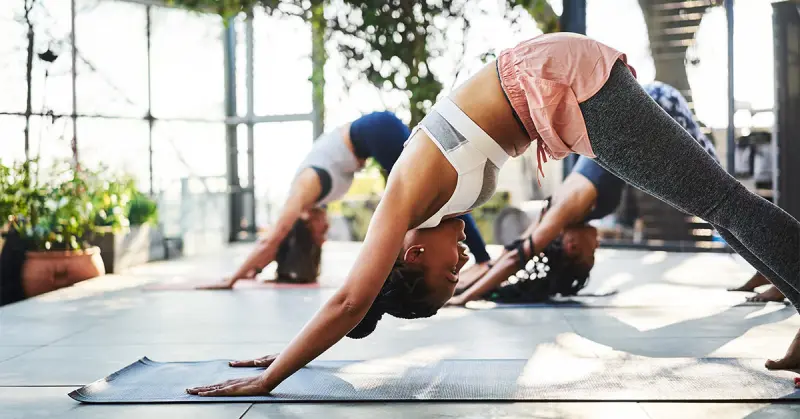"TamarSamirYoga is your online yoga studio that allows you to practice yoga at home 24/7. Find yoga videos, exercise programs, and articles on yoga & meditation."
The Dos: Tips for Yoga Beginners
1. Eating & drinking
In order to avoid unpleasant feelings in the stomach and intestines during the yoga class, the last meal or snack should be at least two hours before the practice. The same applies to stimulating drinks: Before the yoga class, keep your hands off coffee or tea - no matter how tired you are. The stimulating ingredients mask the positive effects of the exercises, you do not achieve the optimal training effect.
2. Muscles like it hot
Before going deeper into individual yoga postures, the body should be prepared for them. Good preparation not only increases the effectiveness of the postures, but also reduces the risk of injuring yourself through overstretching or improper loading. The ideal is the sun salutation , in yoga the warm-up, so to speak, which warms up the muscles and makes them supple.
3. Breath in the flow
Breath should be able to flow freely during the yoga class. If it stops, you are trying too hard, either physically or mentally. If so, shift down a gear or two and let go of your thoughts. The flow of breath will automatically relax.
Why is it important? Flowing breathing supplies our cells with sufficient oxygen while exercising. At the same time, metabolic end products - especially acids - are excreted from the cells with the respiration. And above all, with a relaxed flow of breath, we achieve one of the main goals of yoga: a calm and stable mind.
4. Healthy ambition
The regular path to the yoga mat can only be found with willpower and discipline. But ambition should be kept in check. If you force yourself into positions for which your body tissue is not yet ready, you can seriously injure yourself. Understand situations in which you reach your limits as an exercise in serenity and letting go.
5. Stay with you
We are great masters when it comes to comparing and evaluating: What can my left yoga mat neighbor do better, what clothes is my right neighbor wearing, and why did the woman in front of me look at me so strangely? Yoga teaches you to stay focused with yourself and not to wander constantly. Use the hour to focus on your breath, your body, your practice, your mind.
6. Practice with your head held high
Don't worry or stress yourself by fixating on what you can't or maybe never will. Focus your attention on what you can do, what you do well, and where you are making progress - no matter how big or small you are. This creates gratitude and satisfaction, which is crucial to our peace of mind.
7. Be patient with yourself
The best motto in yoga is: “I am a master who practices!” Train with this in mind, just do your best. And if you wobble in the tree pose, start over - and be patient.
8. The reputation of the mat
If you want to get ahead on your yoga path, you should take the reputation seriously. The best results are achieved by those who practice consistently, persistently and unswervingly. Moderately but regularly, i.e. at least every other day. If you practice daily, take a break one day a week so that the yoga practice does not become a "tooth-cleaning routine" but rather remains something special.
9. Good decisions
If you find an exercise difficult, there are two options. Either it is not for you because it does not correspond to your physique, the range of your joints, your strength or your mobility. It only creates tension or pain. Then let them stay. Or it could be something for you, but you do not succeed because you are still untrained. Then train patiently and steadfastly. What we give up for no good reason sticks to us as something unfinished and leaves a feeling of failure. What we give up for a good reason makes us feel like we have made good and prudent decisions.
You may also like: Body & Mind: Support Healing Processes With Yoga, Yoga Personal Training: Why a Private Lesson? and much more on TamarSamirYoga
The don'ts: what beginners to yoga should avoid
1. Applause? Nothing.
Everyone has skills and talents, an individual physique and a unique tissue structure. Some are agile, but maybe not particularly stable. Others have strength but are not flexible. Comparisons and competitive thinking are therefore pointless - especially if you don't do well in this competition. And nobody applauds either. So leave it the same: first on the yoga mat - and then in the rest of your life.
2. Not because of: hold your breath
Anyone who gets out of breath is completely wrong. In yoga, emphasis is placed on being able to breathe under all circumstances. Otherwise the mind becomes restless and tense. And it is precisely this driven state that we want to get rid of with the help of yoga techniques. Better do a little less, give yourself leeway. And breathe!
If you want to learn more about the breath in yoga, read our article on the yogic breathing exercises .
3. Clench your teeth?
If your jaw is clenched, your face is tense, your breath is shallow, you've gone too far. Yoga practice means exertion and a break from the comfort zone. But overexertion is not yoga. It is counterproductive because it shows mental tension. So: stay relaxed!
4. Everything perfect!
Be especially careful when perfectionism is a familiar pattern. Then practice with extra calm. Excessive accuracy makes you dissatisfied, because no matter what you achieve, it will never be good enough. Do what you can, but with passion and dedication. And as good as you can today. Yoga is a free choice - not an obligation.
5. Exaggerated goals
Pay attention to what goals you set yourself and what time frame you give yourself for them. Most successes in yoga flourish slowly, and the yoga scholar Patanjali pointed out 2000 years ago that rice does not grow faster if you pull it. Leave it to the wisdom of your body when it is ready for a challenging asana.
6. No power to self-doubt
Clumsiness, physical adversity or even "embarrassment" are no reasons to make yourself small. This creates stress and depression. A great yogic quality is the “error-friendliness”. She teaches forbearance and gives everyone the space they need to practice calmly and patiently. Remember: no master has fallen from heaven yet. Not even in yoga.
7. A lot helps a lot?
If you think you have little time, don't go to the yoga mat once a week and do a monster program. That brings little and fizzles out quickly. This is more likely to lead to exhaustion and sore muscles, because this approach is completely unphysiological. It is better to practice less long, but regularly. This is adapted to the needs of our body, which afterwards feels refreshed and strengthened.
If you are new to yoga and you are not sure whether yoga is right for you, please read our health check for yoga beginners .







